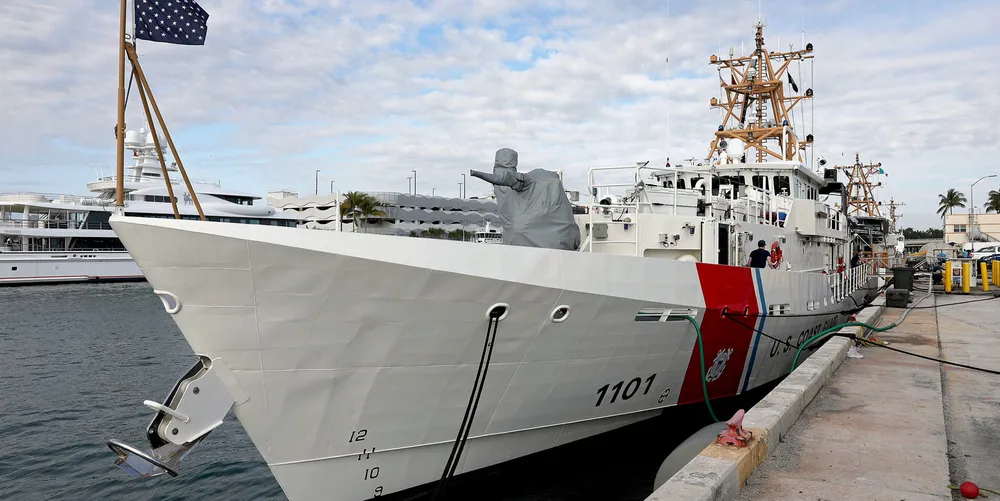New trouble on high seas?| US coast guard bill threatens to 'cripple' offshore wind play
Industry observers raise red flags over little-known amendment to routine authorisation bill that could profoundly impact on nascent sector, Recharge can reveal

The 2022 Coast Guard Authorization Act (CGAA), which passed the House of Representatives yesterday (29 March), includes amendments that would require foreign-flagged vessels operating in US coastal waters on the outer continental shelf (OCS) to adhere to the same rules as US-flagged vessels in having annual inspections by federal authorities.
Moreover, the legislation would require that all crew members be either US citizens or permanent residents, or be citizens of the flag under which the vessel is sailing.
“You have to have a crew that is aligned with the flag of the vessel, just like US crews,” the bill’s sponsor, Louisiana representative Garret Graves said, in recorded testimony during a transportation and infrastructure committee hearing.
“It doesn’t ban [foreign vessels from operating in US coastal waters], it just tries to provide some degree of parity between US vessels and those from other countries.”
Offshore wind developers and installers “have vessels that are Dutch or Belgian or UK flagged, but nobody has a UK crew or a Belgian crew, no one in the world has that,” he said. “This is going to have a huge impact on the entire offshore industry [in the US], not just wind but oil & gas as well.”
The amendment to the CGAA would add another level of complexity to developers' plans by requiring that all workers on the WTIV be either American – an unlikely scenario as the US has as yet no offshore wind workforce – or Danish – equally unlikely amid the scale of demand for workers in the European offshore wind theatre.
“We are extremely concerned about the maritime crewing provision [in the act] as it will cripple the development of the American offshore wind industry,” said Heather Zichal, CEO of industry advocacy body the American Clean Power Association.
“If passed into law, this provision would prevent the US from achieving the administration’s target of deploying 30GW of offshore wind by 2030. As the voice of industry, we remain committed to working with the Senate to stop this anti-jobs provision from being enacted and holding back our nation’s ability to produce more sources of clean homegrown energy.”
The amendment is not directly tied to the Jones Act but instead is rooted in the OCS Lands Management Act which requires that all vessels operating in US coastal waters be US-flagged but offers exemptions for foreign ownership. This amendment would eliminate those exemptions.
“We are working to… train American workers to man offshore wind vessels but we're not there yet,” he said.
“There is tremendous expertise for offshore wind installation with our European allies, with our Asian allies, and we should benefit from the skills transfer that American crews have to learn this trade. This amendment… is really a direct assault on the clean energy industry.”
The International Marine Contractors Association (IMCA), a maritime industry advocacy group, said that if approved, the bill would add “unnecessary and unworkable new obstacles and restrictions.”
“The legislation is not calibrated to improve the safety, security, or efficiency of the offshore energy sector; rather, it seems tailored to cause maximum operational disruption to both the wind and oil and gas sectors... These new regulatory barriers would only have the effect of driving investment, expertise, and projects away from the United States.”
Despite opposition, the bill passed House committee almost unanimously, and puts the industry in an uncomfortable situation of promoting its job-creating credentials while opposing a bill that strives to drive employment.
US maritime industry associations say the bill addresses inequities in maritime law that have long favoured foreign-flagged vessels at the expense of the American merchant marine.
“How is it fair that US companies compete with foreign flagged vessels are allowed to hire people that US companies are legally not allowed to hire, at wages US companies are not legally allowed to pay?” Aaron Smith, head of maritime industry organisation the Offshore Marine Service Association. “This [bill] just closes that loophole, [and] we think that's fair.”
Congress has not revealed when the bill is likely to be debated in the Senate, but industry sources hope that cooler heads will prevail in the upper chamber.
(Copyright)